It’s no secret that technology has revamped how we learn, making education more dynamic and accessible than ever. That’s where finding the right education app development company comes into play.
Choosing who to team up with for your app project is a big deal. You want a partner that gets your vision, has the skills to bring it to life, and, most importantly, shares your enthusiasm for transforming education. We’ll explore what makes a great education app development company, looking at their expertise, previous projects, what their clients say about them, and the tech they use.
We’re also going to highlight some of the top players in the education app development field. Think of it as a curated list of who’s who, giving you a snapshot of each company’s strengths, notable projects, and how they might be the right fit for your educational goals.
And because we’re all about keeping things fresh and informative, we’ll dive into the latest trends shaking up the edtech world. Personalized learning, gamification, and the magic of AR/VR are just the tip of the iceberg.
So, whether you’re here to find the perfect development partner or just curious about the latest in EdTech, you’re in the right place. Let’s explore how the right education app development company can turn your brilliant ideas into engaging learning experiences that make a difference.
Skip ahead:
-
Choosing the right education app development company
Top education app development companies
Trends in education app development
Why invest in educational app development
Choosing the right education app development company
When you’re ready to bring your education app idea to life, picking the right development partner is a make-or-break decision. Given education’s massive appeal in app stores, your choice has to nail it in terms of user satisfaction and business goals. Here’s how to zero in on the perfect company for your project:
Expertise
It all starts with expertise. The best fit will have a team that understands the education industry inside out. They’ve been there, done that, with a track record of successful projects to show for it. This experience means they can navigate the unique challenges of EdTech and deliver a product that resonates with your target audience.
Portfolio
A company’s portfolio is like a roadmap of their journey. It shows you where they’ve been and, more importantly, if they’ve excelled in creating educational apps. Looking through their past projects gives you a glimpse into their technical skills, design capabilities, and the types of solutions they’ve provided to other clients. Happy client testimonials? That’s the cherry on top.
Client reviews
What others say matters. Client reviews offer unfiltered insights into what working with the company is really like. These reviews can highlight the company’s strengths, such as their ability to communicate effectively, meet deadlines, and handle the pressures of EdTech development. Positive feedback from previous clients is a strong indicator of reliability and quality.
Technology stack
The tech behind your app is its foundation. You want a partner who’s up-to-date and strategic about their technology choices. This means they can select the right tools for your app’s specific needs, ensuring it’s scalable, secure, and capable of delivering a seamless learning experience.
Performance rate
Success speaks volumes. A company with a high performance rate in delivering educational apps shows they can turn your vision into a thriving product. This success rate is a reflection of their team’s coordination, understanding of educational needs, and ability to innovate.
Smooth delivery management
Transparency is key. You should be in the loop at every stage of development, ensuring the final product aligns with your expectations. Companies that prioritize clear communication and project updates will help you feel confident and informed throughout the process.
Time efficiency
Time is of the essence. The right company knows this, adhering to deadlines and ensuring your app hits the market without unnecessary delays. Their commitment to efficiency means your app can start making an impact sooner rather than later.
Cost-effective
Value for money is crucial. Education apps are essential tools, not luxury items, so development costs should reflect that. Look for a partner offering transparent pricing and willing to work within your budget to deliver a quality product without cutting corners.
Complete security of app ideas
Protect your innovation. In a world where app ideas can easily be copied, your chosen company must commit to keeping your concept safe until launch. A solid nondisclosure agreement ensures your app remains unique and competitive.
Complete testing measures
Quality is non-negotiable. The right development partner will have a dedicated quality assurance team and a comprehensive testing process. This ensures your app is polished, user-friendly, and free from bugs that could detract from the learning experience.
Choosing the right education app development company is about finding a partner that aligns with your vision, values, and project requirements. With these factors in mind, you’re well on your way to selecting a company that will help you create an educational app that stands out in a crowded marketplace.
Top education app development companies
Navigating the sea of education app development companies can be overwhelming. Yet, some names stand out for their innovative solutions and commitment to excellence. Here’s a look at some of the top companies in the industry, each bringing something unique to the table.
| Company Name | Expertise | Notable Projects | Pricing Models |
| API DOTS | Custom education apps | Interactive and social learning apps | Custom, based on requirements |
| Aglowid | Personalized education solutions | Mobile apps for education companies | Flexible, project-based |
| Guru TechnoLabs | Online and mobile education solutions | Custom eLearning solutions | Varies by project |
| Simpalm | Engaging learning solutions | Online and mobile educational apps | Project-specific |
| Zazz | Smart, scalable educational programs | E-learning apps, education administration | Tailored to client needs |
| Technource | eLearning web app development | Advanced education app solutions | Custom pricing models |
| Quytech | User-friendly educational apps | Mobile applications for education | Competitive, value-based |
| TechGropse | Innovative app development | Cutting-edge eLearning solutions | Flexible, depends on project |
| Maticz | Unique eLearning environments | Comprehensive eLearning app development | Customizable |
| CodeStore Technologies | Latest technology in education apps | Customized applications for online learning | Project-based pricing |
| Thinkific Branded Mobile App | Custom-branded mobile app development | Branded apps for educators and businesses | $199/month added to Thinkific plan |
API DOTS
 Source: API DOTS
Source: API DOTS
API DOTS is known for its bespoke education apps, combining interactive elements with social and blended learning to enhance the student experience. Their focus on edtech solutions tailored to specific needs sets them apart.
- Services Offered: Custom education app development with a focus on interactive elements, social learning, and blended learning solutions
- Notable Projects: Interactive learning apps for various educational institutions
- Pricing Models: Customized pricing based on specific project requirements
Aglowid
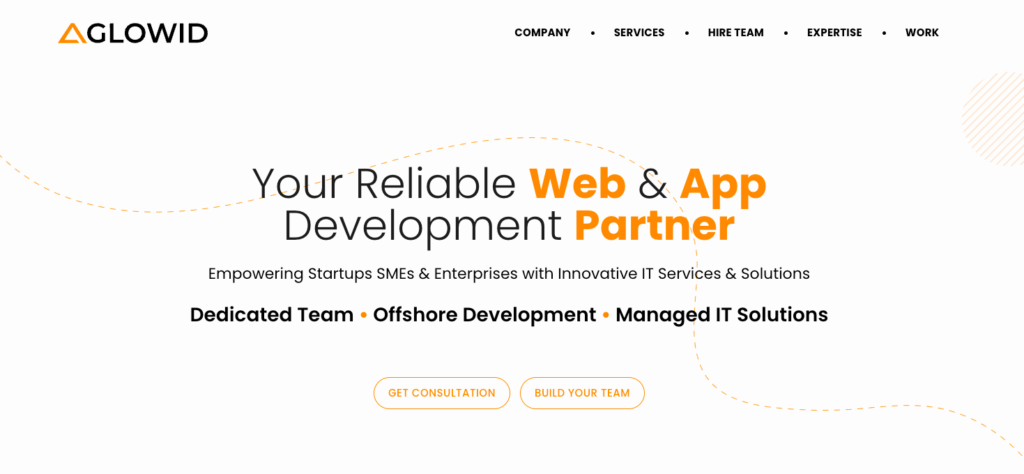 Source: Aglowid
Source: Aglowid
Aglowid excels in crafting personalized education app solutions for learners of all ages. Their expertise spans a broad spectrum of educational app development, ensuring they can meet any project’s unique requirements.
- Services Offered: Development of personalized education app solutions for a wide age range of users
- Notable Projects: Diverse mobile apps for educational companies tailored to unique user needs
- Pricing Models: Flexible, determined by the scope and complexity of the project
Guru TechnoLabs
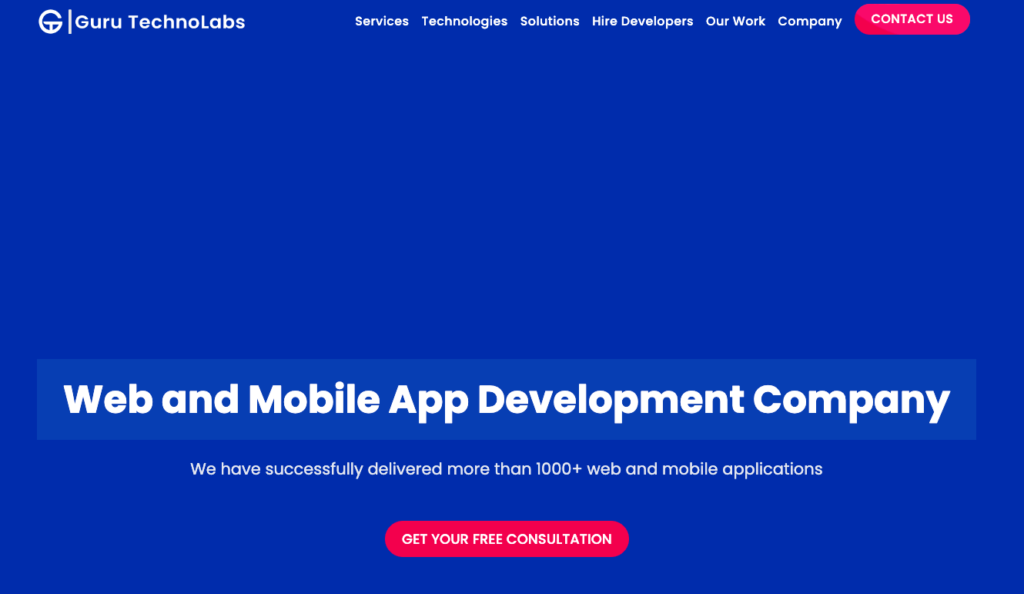 Source: Guri TechnoLabs
Source: Guri TechnoLabs
Guru TechnoLabs offers comprehensive education app development services, focusing on solutions that align with industry trends. They specialize in creating online and mobile solutions for educational institutes, teachers, and students alike.
- Services Offered: Creation of online and mobile solutions for the education sector, aligning with current industry trends
- Notable Projects: Custom eLearning solutions for educational institutes and independent educators
- Pricing Models: Pricing varies based on project specifics and solutions offered
Simpalm
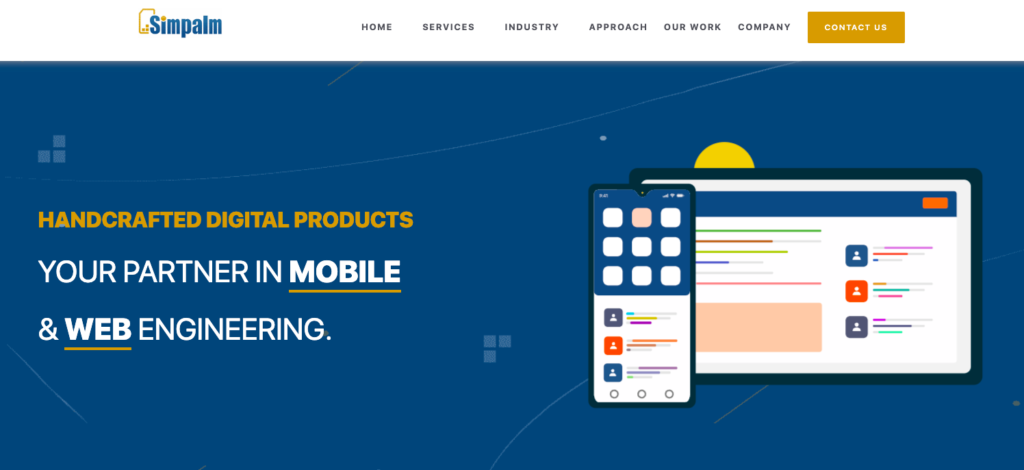 Source: Simpalm
Source: Simpalm
Simpalm designs interactive learning and training solutions that benefit both educational institutions and the creators. Known for their engaging and hassle-free apps, they make learning accessible and enjoyable for students and teachers.
- Services Offered: Designs engaging, interactive learning and training solutions for educational institutions and app creators
- Notable Projects: Development of user-friendly educational apps that facilitate seamless learning experiences
- Pricing Models: Pricing is determined on a project basis, taking into account the app’s complexity and specific requirements
Zazz
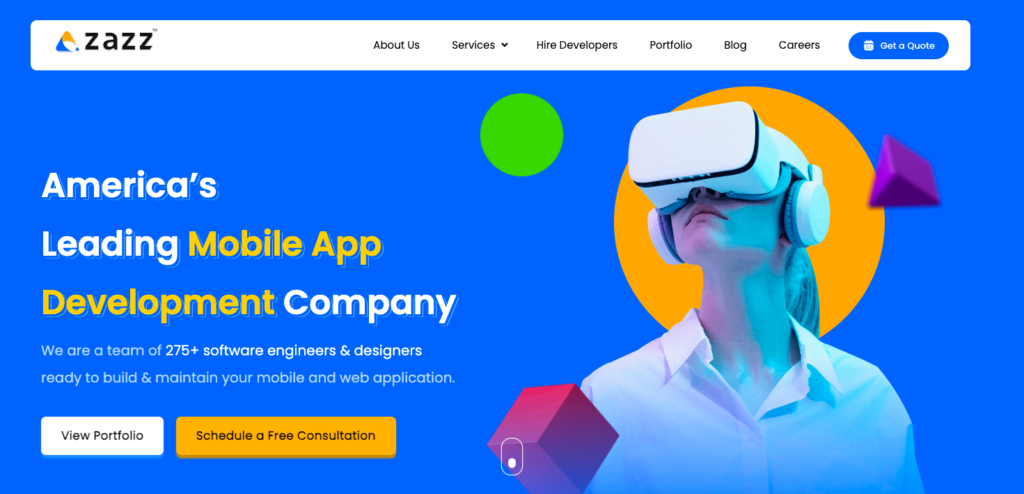 Source: Zazz
Source: Zazz
Zazz prides itself on delivering smart, scalable educational apps and administration services. Their reputation in the education software development market is built on providing exceptional solutions worldwide.
- Services Offered: Offers a wide range of educational app development services, from e-learning applications to education management solutions
- Notable Projects: Renowned for creating scalable and innovative educational software that enhances learning experiences
- Pricing Models: Custom pricing tailored to the needs and goals of each client
Technource
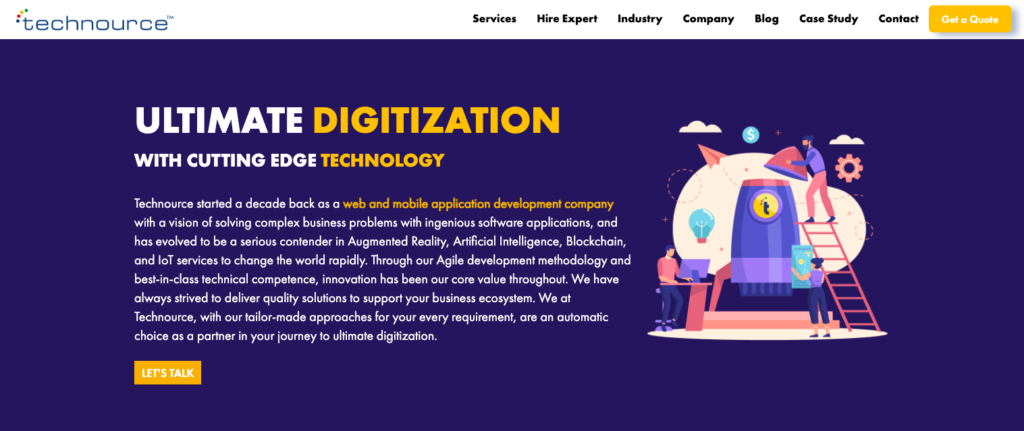 Source: Technource
Source: Technource
Technource is a leader in eLearning web app development, boasting a team of skilled developers who understand the nuances of educational technology, ensuring cutting-edge solutions for their clients.
- Services Offered: Specializes in eLearning web app development, employing advanced technology and design principles
- Notable Projects: Delivers top-tier education app solutions designed to meet the modern demands of online learning
- Pricing Models: Provides custom pricing models based on the complexity and features of the educational app
Quytech
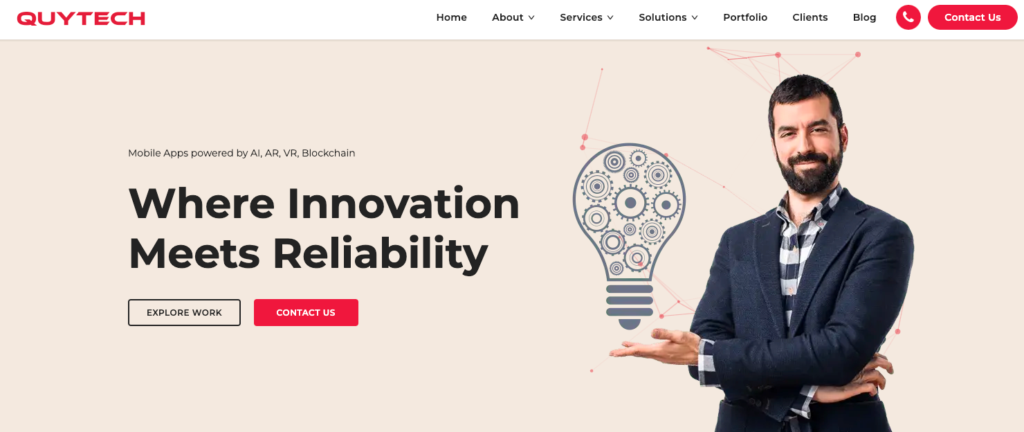 Source: Quytech
Source: Quytech
Quytech specializes in user-friendly educational mobile apps for teachers and students, with a development process that goes beyond just coding to include inspiration, development, and deployment.
- Services Offered: Develops educational mobile applications that are easy to use for both educators and learners, focusing on customization to meet client needs
- Notable Projects: Their portfolio includes a variety of education apps aimed at improving the teaching and learning process
- Pricing Models: Competitive pricing with a focus on delivering high ROI, ensuring affordability and value
TechGropse
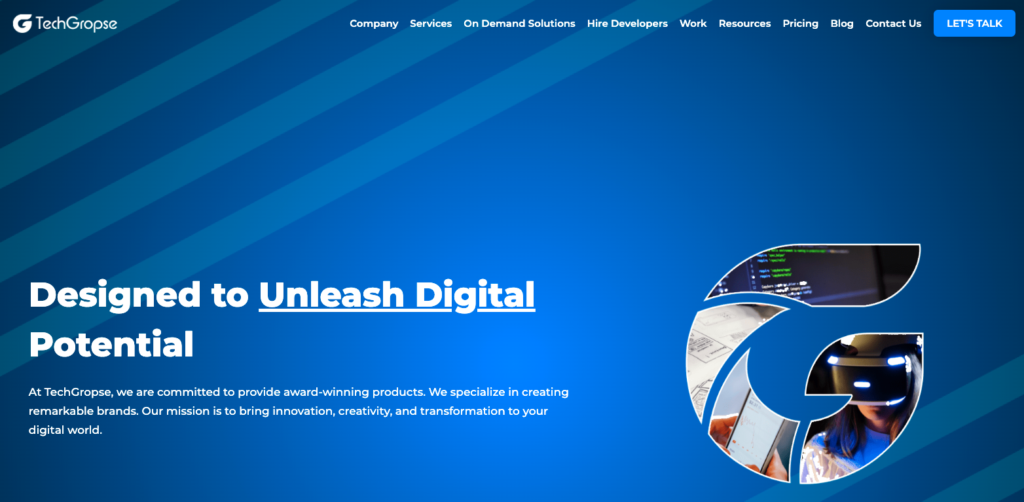 Source: TechGropse
Source: TechGropse
TechGropse excels in enhancing user experience through meticulous planning and innovative app development. Their focus on cutting-edge technology and exceptional features sets them apart in the eLearning app development space.
- Services Offered: Specializes in creating eLearning mobile apps with exceptional features and user interfaces, addressing digital and IT challenges
- Notable Projects: Known for their innovative approach to app development, focusing on user experience and technological advancement
- Pricing Models: Offers flexible pricing depending on the project’s demands and features required
Maticz
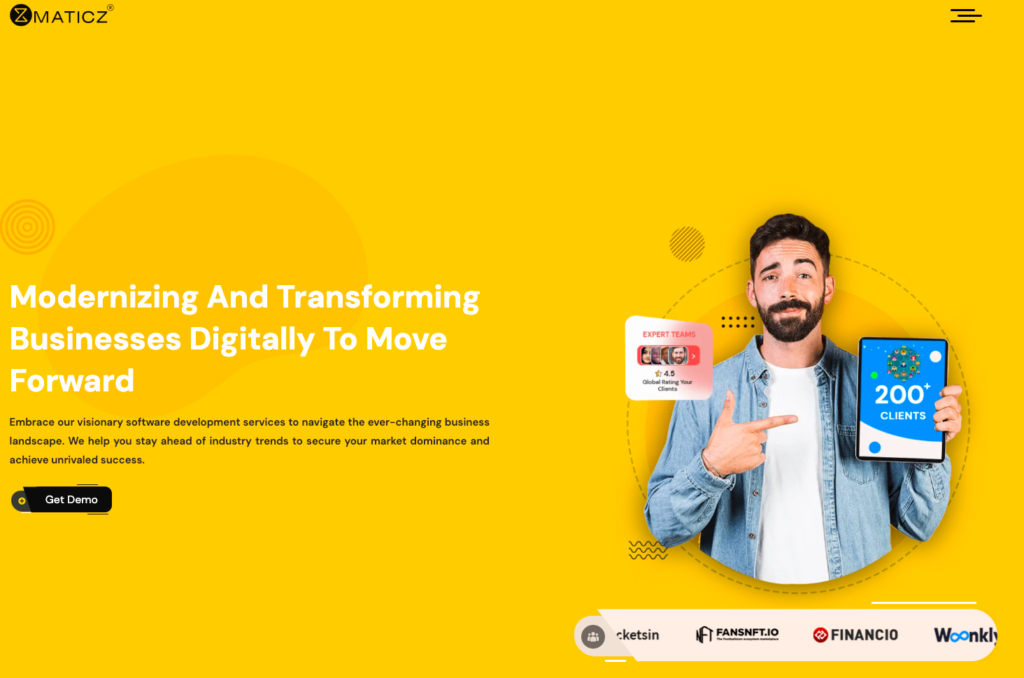 Source: Maticz
Source: Maticz
Maticz offers a unique eLearning environment tailored to meet all client needs. Their detailed development process ensures a smooth, uninterrupted learning experience for users.
- Services Offered: Provides distinctive e-learning app development services, focusing on creating a seamless learning environment
- Notable Projects: Their development process is thorough, ensuring an uninterrupted and engaging learning session for users
- Pricing Models: Customizable pricing based on the development process, from analysis to client-server deployment
CodeStore Technologies
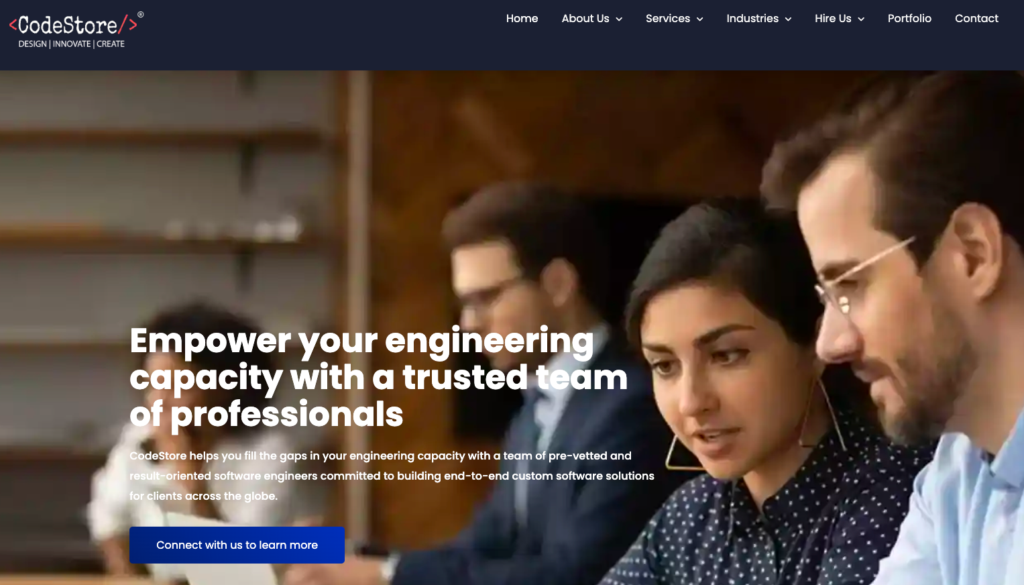 Source: CodeStore Technologies
Source: CodeStore Technologies
CodeStore Technologies focuses on integrating the latest technology to develop innovative interaction models for online learning, catering to the evolving educational landscape.
- Services Offered: Integrates the latest technology to develop innovative educational apps, focusing on online learning solutions
- Notable Projects: Their team is dedicated to creating apps that cater to the emerging educational needs of students learning online
- Pricing Models: Pricing is project-based, considering the app’s features, functionality, and technological requirements
Thinkific Branded Mobile App
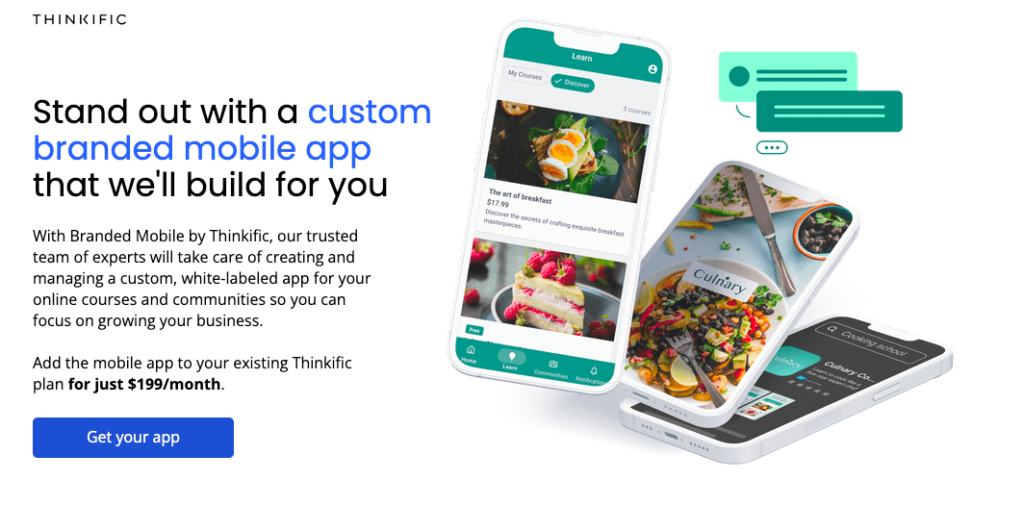 Source: Thinkific
Source: Thinkific
Thinkific Branded Mobile App offers a unique approach to mobile learning, allowing educators and businesses to stand out with a custom-branded mobile app. This service is all about making your brand the star of the show, ensuring that your courses and communities are always within arm’s reach of your audience. With Thinkific, you benefit from a hands-off app development process, where all technicalities are managed by experts, allowing you to focus on content creation and community building.
- Services Offered: Custom-branded mobile app development tailored for online courses and communities. The service includes building, managing, and maintaining a white-labeled app that integrates seamlessly with your existing Thinkific plan.
- Notable Projects: Thinkific has empowered a wide range of educators and businesses by launching their branded mobile apps quickly and efficiently. Customers like Suzanne Leyland have praised Thinkific for the responsive and helpful support throughout the setup process, highlighting the ease and speed of getting their branded mobile app up and running.
- Pricing Models: The service is added to your existing Thinkific plan for a straightforward monthly fee of $199. This pricing model is designed to be accessible for educators and businesses of all sizes, ensuring that anyone can leverage the power of mobile learning without worrying about complex or unpredictable costs.
Thinkific’s Branded Mobile App service is the perfect solution for those looking to leverage mobile learning’s growing popularity. By offering a branded mobile experience, Thinkific helps you connect with your audience on their favorite devices, ensuring your educational content is accessible, engaging, and effective.
Trends in education app development
As we move further into the digital age, the landscape of education app development continues to evolve, driven by new trends and technologies reshaping how content is created, delivered, and experienced. Here are some key trends, backed by our Online Learning Trends 2024 report, that are defining the future of digital learning.
Personalized learning enhanced by AI
The trend towards personalized learning is gaining momentum, with AI playing a pivotal role. As 53% of people consider using AI in their work, its application in education transforms the learning experience. AI algorithms are now more sophisticated, capable of analyzing a user’s performance and learning habits to offer tailored content and recommendations. This makes learning more efficient and ensures that educational content is relevant to each learner’s needs and goals.
Gamification and interactive content
With 48% of people willing to pay for downloadable content from creators they follow, the importance of engaging and interactive content has never been clearer. Gamification elements like points, badges, and leaderboards make learning enjoyable and motivating. By turning educational material into a game, apps can encourage continuous engagement and a deeper understanding of the subject matter.
AR/VR for immersive learning experiences
The integration of Augmented Reality (AR) and Virtual Reality (VR) into educational content offers an immersive learning experience that traditional methods can’t match. For instance, 47% of 18-25-year-olds use TikTok for learning, indicating a shift towards more visual and interactive platforms. AR and VR can bring complex subjects to life, making them more accessible and engaging for learners of all ages.
Leveraging analytics for insight-driven education
The use of analytics in education apps provides valuable insights into student performance and engagement patterns. This data-driven approach enables educators and app developers to tailor content more effectively, ensuring that learning experiences are optimized for success. With platforms like Thinkific, creators have access to comprehensive analytics that help them understand how their content is consumed and how it can be improved.
Expanding to unconventional platforms for learning
The boundaries of online learning are expanding beyond traditional platforms. With 47% of young adults using TikTok for educational purposes, it’s clear that all platforms are becoming viable spaces for learning. This trend highlights the importance of adapting content for different mediums, reaching learners where they already spend their time, and offering them valuable, educational content in formats they enjoy.
Creating private communities for authentic connections
As social media becomes increasingly saturated with negative content, with 69% of people observing more negativity than five years ago, private communities have emerged as sanctuaries for meaningful learning and connection. These spaces offer a respite from the noise of broader social networks, allowing for deeper engagement and more personalized learning experiences.
Embracing the shift towards older digital creators
The creator economy is diversifying, with nearly one in five people aged 41-56 considering themselves digital creators. This shift reflects a broader range of life experiences and expertise entering the online learning space, enriching the content available and expanding the audience for educational apps.
Why invest in educational app development
Developing educational apps offers significant benefits for businesses and institutions:
- Improved learning experience: Apps deliver interactive and engaging content, making learning more enjoyable and effective. They support multimedia formats, interactive exercises, and real-time feedback, which can significantly enhance the learning experience.
- Wider reach: Educational apps can reach a global audience, breaking down geographical and financial barriers to education. They make your content accessible to anyone with a smartphone or tablet, expanding your potential user base.
- Data-driven insights: Apps collect valuable data on user engagement and performance, offering insights that can guide content development and teaching strategies. This data-driven approach helps create more effective educational materials and personalized learning experiences.
Choosing the right technology stack
When building an educational app, the technology stack you choose lays the foundation for the app’s performance, user experience, and scalability. Let’s dig deeper into the components of a technology stack and how to select the right technologies for your project.
Front-end technologies
The front-end is what your users interact with, so it’s crucial for the interface to be intuitive, responsive, and accessible across devices. Here’s a closer look at the front-end technologies:
- HTML5 and CSS3 are the backbone of web app interfaces, allowing you to structure content and style it in a way that’s engaging and accessible.
- JavaScript and its frameworks, such as React or Angular, enable you to create dynamic and interactive user experiences. React, for instance, is known for its virtual DOM feature, making app interfaces incredibly fast and smooth. Angular provides a comprehensive framework with tools and libraries, reducing the need for third-party resources.
- For mobile app development, you might consider React Native or Flutter. React Native allows for the development of native apps for both Android and iOS using a single JavaScript codebase, while Flutter, developed by Google, is known for its fast rendering and ability to create custom app designs with its own widget sets.
Back-end technologies
The back end handles the app’s logic, server configuration, and data management. It’s the engine room of your application. Here are some options:
- Node.js is a JavaScript runtime that’s efficient for building scalable network applications. It’s particularly suited for apps that require real-time data processing and high concurrency.
- Ruby on Rails is a server-side web application framework that follows the MVC (Model-View-Controller) architecture, known for its “convention over configuration” philosophy, which simplifies and speeds up app development.
- Python, along with its web frameworks like Django and Flask, is favored for its readability and efficiency. Django is a high-level framework that encourages rapid development and clean, pragmatic design, while Flask offers more flexibility and simplicity for smaller projects.
Database choices
A robust database is critical for storing, organizing, and accessing data efficiently. Your choice should depend on the nature of your data and the scalability requirements of your app:
- MongoDB is a NoSQL database that’s best suited for apps requiring flexibility and the ability to store unstructured data. It’s ideal for educational apps that handle diverse content types and user-generated data.
- PostgreSQL is an open-source relational database that offers advanced features like table inheritance and function overloading. It’s a great choice for apps with complex data structures or those that require robust data integrity.
- MySQL is another popular relational database known for its reliability and ease of use. It’s suitable for a wide range of applications, including those needing to manage large data volumes.
Selecting the right technology stack is a critical decision that can influence your app’s functionality, user experience, and future growth. Consider the specific needs of your educational app, including its features, target audience, and scalability plans. Consulting with experienced developers can provide valuable insights and help you choose a technology stack that aligns with your project goals and budget.
Wrapping up
We’ve covered a lot in this article, from the importance of finding the right education app development company to the latest trends that are changing the game in digital learning. Education app development is an exciting field that’s making learning more interactive, personalized, and accessible for everyone.
For businesses and institutions looking to make their mark, now is the time to dive into education app development. With the right development partner who shares your enthusiasm and understands your vision, you can create apps that truly stand out. Remember, it’s not just about using the latest technologies like AR/VR or gamification; it’s about how you use these tools to create meaningful and engaging learning experiences.
So, are you ready to take the next step? Whether you’re enhancing what you already offer or starting from scratch, the potential to create something impactful is enormous. The future of education is bright, and with the right approach, your app can be a part of that future. Let’s get started on turning those innovative ideas into reality and making learning better for everyone.
FAQ
How much does it cost to develop an educational app?
Costs can vary widely based on features, complexity, and the technology stack used, ranging from a few thousand dollars for a basic app to over $100,000 for a feature-rich, custom-built application. It’s essential to define your app’s requirements clearly and consult with development companies for accurate estimates.
How long does it take to build an education app?
The development timeline depends on the app’s complexity and features, ranging from a few months to over a year. Planning, design, development, and testing phases all contribute to the timeline, with more complex apps requiring additional time for each stage.
What are the key features of a successful educational app?
A successful educational app typically includes a user-friendly interface, engaging and interactive content, personalized learning experiences, and robust analytics to track progress. Other features might include social learning capabilities, offline access, and integration with existing educational resources.






